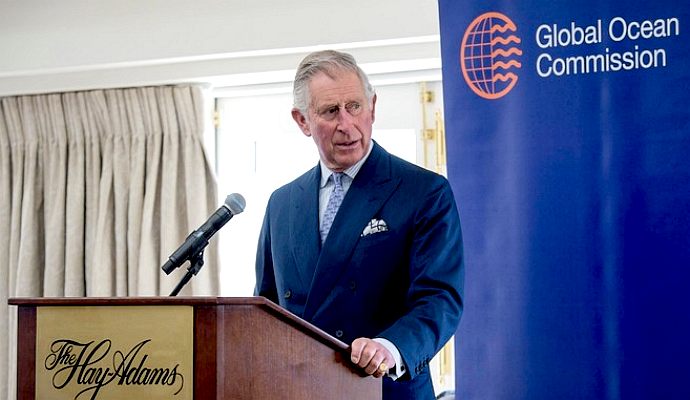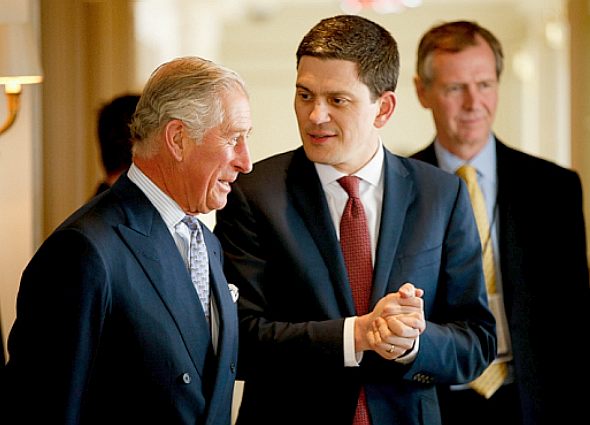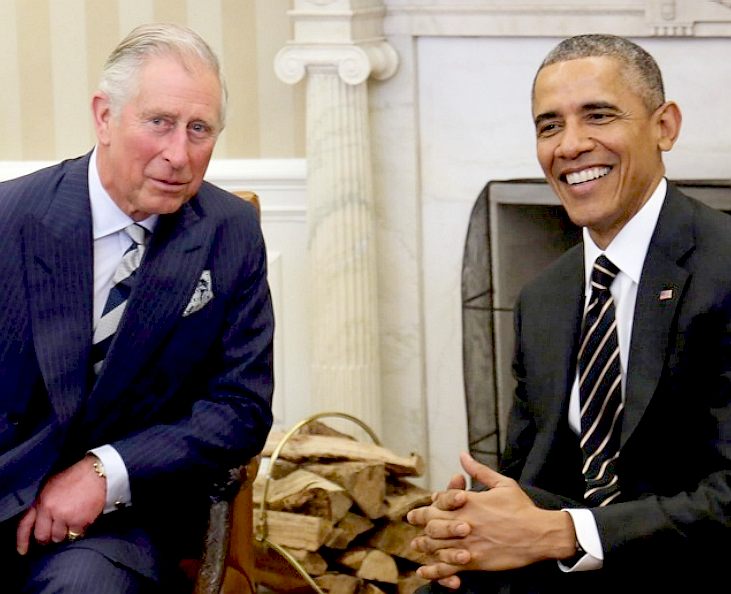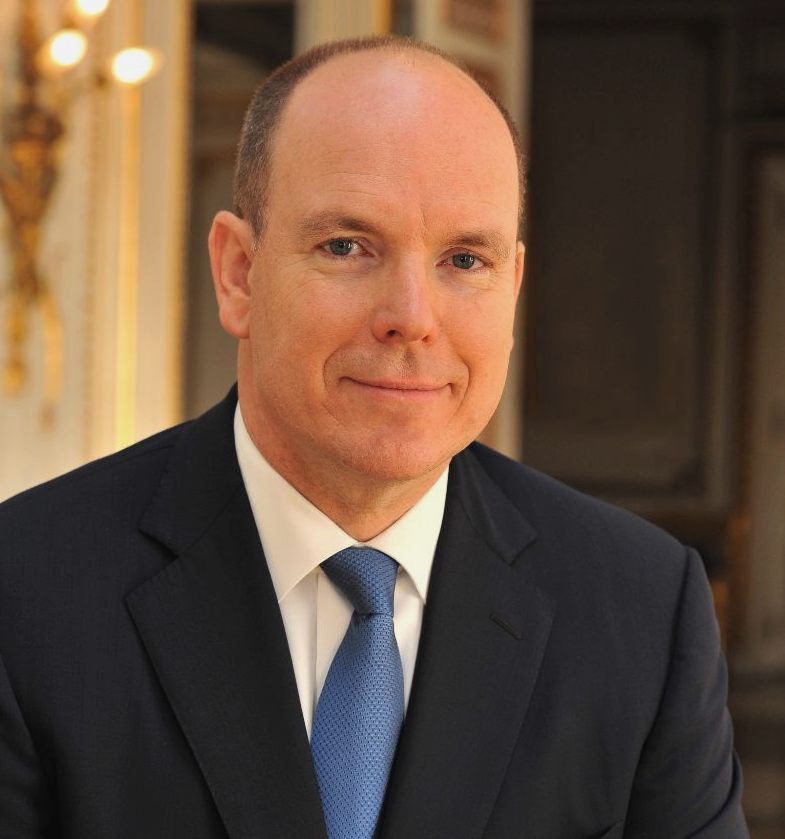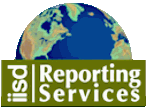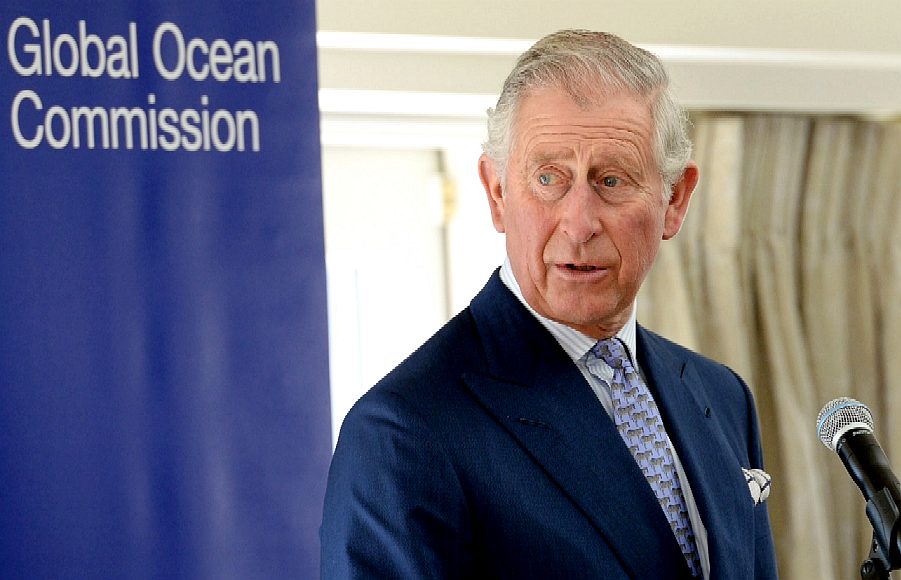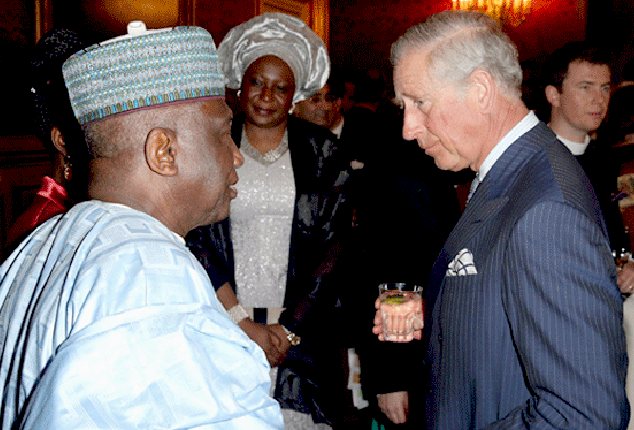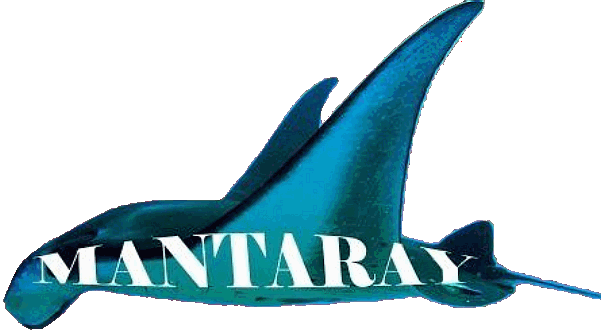|
HRH THE PRINCE OF WALES
|
|
|
HRH at the event in Washington DC
SPEECH PUBLISHED 18th MARCH 2015
"Your
Excellencies, Under Secretary of State, Ladies and Gentlemen, I am so
heartened by the fact that it has proved possible for my International
Sustainability Unit and the Global Ocean Commission to convene this
meeting, not to mention the fact that so many people of critical
importance and relevance to the issue of plastic in the marine environment
have felt able to attend.
THE TELEGRAPH 19 MARCH 2015 - US TOUR, PRINCE OF WALES CLEANER OCEANS PLEA
The Prince of Wales invoked his soon-to-be born grandchild last night as he delivered an impassioned plea to curb the massive amounts of plastic waste currently being dumped in the world’s oceans.
WHITEHOUSE VISIT - Prince Charles met US President Barack Obama on a visit to the White House's Oval Office in March 2015 and were told by the President that British royals are more popular among Americans than US politicians. It is reported that Mr Obama told the Prince of Wales: "I think it's fair to say that the American people are quite fond of the royal family," and the prince replied: "That's awfully nice to know." The president then joked: "They like them much better than they like their own politicians," and Charles added with a laugh: "I don't believe that."
Dozens of photographers, journalists and cameramen were present, including the Sun newspaper's veteran royal photographer, Arthur Edwards. The future king of England explained to President Obama that Arthur had been photographing the prince for more than 35 years, adding that the first president he had reported on in the US was Ronald Reagan. On hearing this information Mr Obama replied: "Awesome."
The Prince of Wales networking
THE
GLOBAL OCEAN COMMISSION & INTERNATIONAL RESCUE
The high seas constitute 45% of the Earth’s surface. According to research reviewed by the Commission, this major proportion of the global ocean is under severe and increasing pressure from over-fishing, damage to important habitat, climate change and ocean acidification. The Commission comprises senior political figures, business leaders and development specialists, and deliberates with a diverse group of constituencies. These include existing ocean users, scientists, economists, business leaders and trade unions.
The Commission will publish its final recommendations in early 2014, shortly before the United Nations General Assembly begins discussions on protecting high seas biodiversity. The Commission’s report will consist of proposals improve the system of governance, thus ending high seas over fishing, stopping the loss of habitat and biodiversity, and improving monitoring and compliance.
The Global Ocean Commission
Prince Charles engaging with the Co-Chair of the Global Ocean Commission, David Miliband. The Ocean Elders would no doubt approve of the GOC, since they had put the formation of such an organisation on their agenda, some years ago. Entrepreneur, Richard Branson is an Ocean Elder.
Prince Albert II of Monaco is also an avid supporter of cleaner oceans
SUMMARY REPORT OF THE MEETING
Claudia McMurray, Senior Counsellor, International Sustainability Unit (ISU), opened the meeting on Wednesday, 18 March 2015, and welcomed participants to Washington, DC. She encouraged participants to identify a concrete program to move forward on the issue of plastic waste in the marine environment. She noted the meeting would take place under Chatham House rules, with the exception of the opening speakers and the high-level session, to encourage an open discussion on the issue and possible solutions.
OPENING SESSION
Catherine Novelli, Under Secretary of State for Economic Growth, Energy, and the Environment, encouraged participants to look at the issue as an opportunity to drive practical solutions and to develop a road map with benchmarks. Novelli emphasized the need to reduce waste generation globally, noting that waste collection rates are lowest in areas where generation is highest, and encouraged finding ways to close this gap. She emphasized the need to develop infrastructure for waste management, and highlighted examples in which the value of waste has resulted in its recapture and reuse. She also highlighted the need to consider redesign opportunities and to look upstream for ways to use less plastic or find alternatives to petroleum-based plastics, and said government should enable and not stifle innovation. Novelli called participants’ attention to the “Our Oceans” Conference that the US organized in June 2014, and said Chile will host the next Our Oceans Conference in October 2015.
OVERVIEW OF THE CIRCULAR ECONOMY:
Andrew Morlet, CEO, Ellen MacArthur Foundation, discussed the concept of the circular economy. Rather than be discarded, he said material economic inputs should stay in the economy for longer through sharing, reselling, leasing, and reuse as manufacturing inputs.He noted the importance of designing products with repurposing, reuse and recycling in mind. He noted C100 and Project Mainstream, two platforms that join materials and recovery actors and share best practices. He underscored the need to: create a global plastics packaging roadmap that endorses a vision of materials as reentering the economy; design plastics consistent with this vision; collate waste recovery solutions; and spread these concepts to international markets.
THE MARINE PLASTICS CHALLENGE:
Jenna Jambeck,University of Georgia, said the quantity of ocean plastic is primarily affected by waste mismanagement and population density on coasts. She emphasized that some middle-income economies have not developed the waste management systems necessary to keep pace with their growing economy. Suggesting culturally appropriate solutions, she urged working with developing countries on designing waste infrastructure and incentives for collection and reprocessing to achieve environmental, economic and public health benefits. She also noted that plastics do not biodegrade, but rather fragment into micro-plastics that are found in all areas of the ocean.
ECONOMICS OF PLASTIC WASTE:
Martin Stuchtey, Director, McKinsey Center for Business & Environment, discussed an initiative that recently commenced in the Philippines and involves multiple partners, from WWF to Coca-Cola and the Global Environment Facility (GEF), in a multi-year effort that seeks to prevent plastic waste from entering the seas. He highlighted that there is a recycling and collection economy in the Philippines for higher-value plastics such as PET bottles, of which 90% are recycled. He suggested finding ways to increase the value of low-value plastics. He said action to address plastic waste could include enforcing laws more vigorously, taking advantage of new technology and broadening partnerships. He concluded by stating that “this is an opportunity to get the global commons right.”
PANEL DISCUSSIONS
SYSTEMS THINKING ON WASTE: CAN THE CIRCULAR ECONOMY PROVIDE LONG-TERM SOLUTIONS FOR PLASTIC WASTE IN THE MARINE ENVIRONMENT?
A facilitator guided a panel discussion on whether the circular economy can provide long-term solutions for plastic waste in the marine environment. The five panelists suggested, inter alia: casting the issue in terms of benefits to cities and society, given that “not everyone may care as much about the oceans as we do;” looking at design issues, including the materials that are being put into the supply chain; identifying a “short game” and a “long game;” and adopting a goal of zero plastic discharge into the marine environment, or even into the environment given the close links between sea and land based discharge. Panelists suggested that solutions would be different for specific contexts, including within developed and developing countries. A panelist noted that the discussion on this topic has advanced since the Fifth International Marine Debris Conference convened in 2011, and another highlighted the role of data to assist in prioritizing action. A panelist noted confusion among the public about what is recyclable, and another panelist suggested that solutions should meet consumer needs in ways that do not require them to consider the complexity of plastic coding and that help the individual “be a good consumer.” Cultural engagement was highlighted as a part of the solution, as was active engagement of a variety of stakeholders, including legislators. In conclusion, the facilitator noted an emphasis on finding ways to motivate behavioral change, including through cultural roots, building partnerships, and using the policy space to drive more ambition.
Roundtables: Meeting participants continued the discussion on this topic in eight round tables. Among other ideas, these round table discussions highlighted the role for education, getting the incentives right to encourage collection, and moving toward a regime shift in design. Speakers asked how a recycling market could be created for lower-value plastics, how to keep plastic out of the ocean, and how a road map could add value. In the short term, speakers suggested selecting a region or specific problem and focusing actions to address it. Efforts to identify what already exists in terms of lessons learned and initiatives were suggested as a way to identify gaps. In this regard, the tourism sector and attention to Africa were noted to be potential gaps. Other roundtables discussed financial mechanisms and incentives as crucial elements for the solution, especially ways to make plastic reuse, recycling and repurposing profitable in developing countries. Participants urged government-led commitments such as a goal of zero plastic waste discharge or banning plastic bags. New York City and San Francisco were noted as leaders for ban of polystyrene single-use packaging and of plastic bags, respectively.
Participants discussed how to encourage change in the private sector. Voluntary certifications similar to Forest Stewardship Council were identified as potential incentives. Others urged strong regulatory action to mandate change in the private sector. Awareness-raising ideas included teaching youth about the value of plastics, helping consumers recognize recyclable plastics, and recognizing the role of retailers in promoting recycling and reuse.
Each round table then shared a few key points from their discussion with the full meeting. One table emphasized attention to emerging markets and identifying how to build tailored pathways for different regions and different actors. Another highlighted a need for a global road map that is “owned” by all stakeholders, with short and long term objectives and actionable activities. A third table called for attention to the boundaries of the system and the type of financing partnerships that need to be developed. Another table suggested developing a proof of concept through focusing on solutions at the national or regional level, and to analyze how to apply them to other parts of the world. The next table cited the need for dialogue to spark coalition building and raise awareness. Another table emphasized the need for better information for decision making, including at the company level, on plastics packaging and design, and at the city and government level, on best practices for waste management particularly in emerging markets. Another table summarized its discussions by remarking, “This agenda needs a Tesla moment!,” while the last table urged the adoption of an ambitious, long-term goal of zero plastic waste discharge into the marine environment.
MARINE PLASTIC WASTE - The Prince’s Charities International Sustainability Unit (established by HRH The Prince of Wales) and the Global Ocean Commission convened a meeting, titled “Marine Plastic Waste and the Circular Economy: Building Long-term Solutions to Immediate Challenges,” on 18 March 2015, in Washington, DC, US. Taking place at the Hay-Adams Hotel, one block from the White House, the event gathered approximately 90 representatives from business and industry, governments and civil society. In addition to statements, panel presentations and roundtable dialogues, a high-level session convened in the afternoon to hear from HRH The Prince of Wales and Co-Chairs of the Global Ocean Commission David Miliband and José María Figueres.
The possibilities of adopting an ambitious, long-term goal of zero plastic waste into the marine environment were discussed. Assessments of the costs of inaction were proposed, as was a waste management innovation fund. And some participants urged calling for developing a better understanding of the toxicities and impacts of plastics in the ocean on humans.
The event sought to facilitate a dialogue framed around four broad areas: 1. linkages between short-term action on preventing and eliminating plastic waste from entering the marine environment, and longer-term systemic change towards a circular economy; 2. opportunities for the private sector to collaborate with other stakeholders to scale up waste management approaches; 3. gaps in knowledge and data required to address plastic waste entering the marine environment; and 4. the need to integrate regional and local stakeholders into the global narrative.
Participants emphasized the importance of developing a global road map that is “owned” by all stakeholders and discussed the needs for financing partnerships and pilot projects from which lessons learned could be analyzed and scaled up.
DECEMBER 2014 - Pope Francis tells us to look out for nature, or nature will not look after us. President Obama shares this view, most especially concerning climate change and ocean acidification.
PRACTICAL SHORT-TERM SOLUTIONS THAT STEM THE FLOW OF PLASTIC AND PREPARE THE GROUND FOR CIRCULARITY:
This panel noted the importance of local partnerships in communities targeted for waste recovery efforts, and of understanding the local context, particularly in developing countries where waste pickers have different roles and efficiencies. One panelist suggested that financial incentives to collect waste should enhance, not disrupt, the local economy. A program to collect nets from fishermen in the Philippines and transform them into nylon yarn was highlighted. Participants identified access to capital as a barrier to new waste collection businesses and programs in many developing countries, and development agencies and multilateral banks were proposed as part of the solution. Panelists also discussed promoting waste to energy with national feed-in tariffs. On technological advances, one panelist noted recent innovations in waste sorting and cleanup, and hoped for progress in modifying recycled plastics to act more like virgin plastics in manufacturing. Another panelist suggested that collecting and treating film plastics for reuse held promise.
Roundtables: Meeting participants continued the discussion on this topic in eight round tables. Participants considered whether commonalities could be found among project requirements for islands, small municipalities and large municipalities, for example. The need for financial instruments that would remove some risk for investments was highlighted, as was investors’ interest in investments that could be scaled up rather than one-off investments. Establishing ownership from the bottom was noted to be beneficial in addressing concerns about corruption. And the importance of education of the next generation as well as present-day consumers was emphasized.
Other roundtables discussed the importance of baseline data. They noted that some data, such as production statistics, are accurate and readily available, while others, such as the amount of plastic discarded into the ocean, are difficult to uncover. Participants expressed curiosity over how much plastic ocean gyres contain and how much remains unaccounted for. The notion of a plastic footprint, similar to a carbon footprint, was raised as a method to encourage self-regulation and measurable action by cities, companies and even individuals. They suggested that such a footprint could also spur public pressure on corporations and provide benchmarks for corporate social responsibility. Some participants addressed the connection between public health and waste management, noting that trash could be a vector for disease, and suggested that such data could help spur action, especially at the local level. Participants agreed that understanding the toxicities of plastics in the ocean to animals and humans was a key knowledge gap.
Each round table then shared a few key points from their discussion with the full meeting. A roundtable reported that discussions had emphasized the need to ensure that financing is used for the right solutions. One group stressed the need to fill knowledge gaps, analyze commonalities of success, identify how these commonalities could be applied to other cases, and advance this conversation in the next few months. The importance of capacity building, targeted intervention, piloting projects in a few countries, and assessing the pilot projects was highlighted. Assessments of the costs of inaction, such as swimming in oceans filled with plastic bags, were proposed, as was a waste management innovation fund, and opportunities for leaders to network. One table recommended enacting the polluter pays principle, such as through taxing plastics or developing a cap and trade policy. Another table proposed creating a market for secondary feed stocks by involving waste pickers and certifying the quality of the collected inputs. Collating information and best practices on global plastics manufacturing and reprocessing was suggested, and several groups urged developing a better understanding of the toxicities and impacts to humans of plastics in the ocean, and the need for better corporate collaboration.
HIGH-LEVEL SESSION
José María Figueres, Co-Chair Global Ocean Commission and Former President of Costa Rica, thanked HRH The Prince of Wales for his leadership on the environment and oceans especially. He emphasized the objective of keeping plastics out of the ocean, and called attention to the Global Ocean Commission’s report, titled “From Decline to Recovery: A Rescue Package for the Global Ocean,” which includes a recommendation to keep plastics out of the ocean. He recalled that speakers earlier in the day had called for thinking about the roles of markets and regulation and how to create new markets to address plastic waste, and welcomed the opportunity to hear HRH The Prince of Wales’ thoughts on this issue.
His Royal Highness The Prince of Wales noted that he was pleased the comparatively low level of attention to ocean issues is rising and that the state of our ocean has begun to receive the attention it deserves. He congratulated US Secretary of State John Kerry for convening the Our Oceans Conference and for what he has done to put oceans at the heart of the global agenda. He noted that almost half of all marine animals have plastic in their gut, resulting in costs to the global economy and impacts on the food chain. HRH The Prince of Wales said there appear to be solutions, including through improved waste management, the examination of how waste is created within supply chains, the integration of marine littering into national waste management systems, and ensuring that both consumers and industry pay the real costs, including externalities. He said it is crucial to speed up the transition to a circular economy, and expressed his warmest gratitude to the Global Ocean Commission for its work with the International Sustainability Unit. He concluded by noting that, as he will have a new grandchild soon, we owe it everyone’s grandchildren to grasp the solution.
David Miliband, President and CEO, International Rescue Committee, and Co-Chair, Global Ocean Commission, said the Commission was established to: understand and document what is happening to the global ocean; raise awareness on ocean degradation; make practical proposals for action; and build coalitions across the public sector, private sector and NGO actors to take action in industrial and emerging economies. The Commission, he said, has highlighted that 2015 is a year of decision, as it will recognize oceans in the Sustainable Development Goals. He said this meeting shows that plastics must be part of any goal and solution on the global ocean. Miliband identified the need to: think about the entire plastic supply chain, from producer to consumer and waste manager; spur innovation in systems to handle plastics; develop partnerships with governments as a leader and the private sector as an innovator; and engage emerging economies. He concluded by sincerely thanking HRH The Prince of Wales for focusing his convening power on this issue.
UPCOMING MEETINGS
Intergovernmental Negotiations on the Post-2015 Development Agenda:
The intergovernmental negotiations on the post-2015 development agenda, which will prepare for the UN Summit, will hold the following sessions: 23-27 March (SDGs and targets); 20-24 April (MOI and Global Partnership for Sustainable Development); 18-22 May (Follow up and review); and 22-25 June, 20-24 July, and 27-31 July (intergovernmental negotiations on the outcome document). location: UN Headquarters, New York contact: UN Division for Sustainable Development phone: +1-212-963-8102 fax: +1-212-963-4260 email: dsd@un.org www: https://sustainabledevelopment.un.org/post2015
16th Meeting of the UN Open-ended Informal Consultative Process on Oceans and the Law of the Sea: The Consultative Process is intended to facilitate the annual review by the General Assembly of developments in ocean affairs and the law of the sea by considering the Secretary-General’s report on oceans and the law of the sea and by suggesting particular issues to be considered by the General Assembly, with an emphasis on identifying areas where coordination and cooperation at the intergovernmental and inter-agency levels should be enhanced. dates: 6-10 April 2015 location: UN Headquarters, New York contact: Secretary of the United Nations Open-ended Informal Consultative Process on Oceans and the Law of the Sea phone: +1-212-963-5915 fax: +(212) 963-5847 e-mail: doalos@un.org www: http://www.un.org/depts/los/consultative_process/consultative_process.htm
68th Session of the IMO Marine Environment Protection Committee: The Marine Environment Protection Committee (MEPC) of the International Maritime Organization (IMO) will hold its 68th session from 11-15 May 2015, in London, UK. dates: 11-15 May 2015 location: London, UK contact: IMO Secretariat phone: +44-20-7735-7611 fax: +44-20-7587-3210 e-mail: info@imo.org www: http://www.imo.org/MediaCentre/MeetingSummaries/Pages/Default.aspx
Fifth Meeting of the Global Ocean Commission: The Global Ocean Commission will hold its fifth plenary meeting in New York. dates: 17 May 2015 location: New York City, US contact: Global Ocean Commission Secretariat phone: +44-1865-280742 email: contact@globaloceancommission.org www: http://www.globaloceancommission.org/
48th Meeting of the GEF Council: The Global Environmental Facility (GEF) Council meets twice per year to approve new projects with global environmental benefits in the GEF’s focal areas, and to provide guidance to the GEF Secretariat and Agencies. dates: 2-4 June 2015 location: Washington D.C., US contact: GEF Secretariat phone: +1-202-473-0508 fax: +1-202-522-3240/3245 email: secretariat@thegef.org www: http://www.thegef.org/gef/node/10938
World Oceans Day 2015: World Oceans Day has been celebrated annually, on 8 June, since the UN General Assembly adopted resolution 63/111 in December 2008. date: 8 June 2015 www: http://www.un.org/en/events/oceansday/
UN Summit to Adopt the Post-2015 Development Agenda: The summit is expected to adopt the post-2015 development agenda, including: a declaration; a set of Sustainable Development Goals, targets, and indicators; their means of implementation and a new Global Partnership for Development; and a framework for follow-up and review of implementation. dates: 25-27 September 2015 location: UN Headquarters, New York contact: UN Division for Sustainable Development fax: +1-212-963-4260 email: dsd@un.org www: https://sustainabledevelopment.un.org/post2015/summit
Second Our Oceans Conference: At the conclusion of the June 2014 Our Oceans Conference, which was convened by the US State Department in Washington, DC, Chile offered to host the second meeting. dates: October 2015 location: Chile www: http://www.state.gov/documents/organization/228006.pdf
LINKS & REFERENCE
Telegraph US-royal-tour-Prince-of-Wales-makes-plea-for-cleaner-oceans Prince-of-Wales-speech-hrh-the-prince-of-wales-event-titled-plastic-the-marine-environment-scaling Daily Mail Charles-horrified-toll-plastic-dumped-sea-Prince-Wales-plea-solve-issue-sake-future-generations The Guardian environment 2015 March 19 Prince-charles-calls-for-end-to-dumping-of-plastic-in-worlds-oceans http://abcnews.go.com/US/wireStory/prince-charles-speaks-dangers-plastic-waste-oceans-29736519 Time environment-prince-charles-oceans National Geographic Prince Charles oceans trash plastic britain Wikipedia Global_Ocean_Commission ITV 2015-03-18 prince-charles-makes-impassioned-plea-for-oceans-clean-up ITV news March 2015 Obama tells Prince Charles Americans prefer British royals to US politicians IISD circular economy and plastics ocean waste Belfast Telegraph President Obama highlights monarchys appeal Plastic soup foundation 2015 March Prince Charles calls for end of dumping plastic in the oceans http://www.plasticsoupfoundation.org/en/2015/03/prince-charles-calls-for-end-of-dumping-of-plastic-in-the-ocean/ http://www.belfasttelegraph.co.uk/news/uk/obama-highlights-monarchys-appeal-31078831.html http://www.iisd.ca/oceans/plastics/ http://www.iisd.ca/oceans/plastics/html/crsvol186num5e.html http://www.itv.com/news/2015-03-19/obama-tells-prince-charles-americans-prefer-british-royals-to-us-politicians/ http://www.oceancouncil.org/site/events.php http://abcnews.go.com/US/wireStory/prince-charles-speaks-dangers-plastic-waste-oceans-29736519 http://www.globaloceancommission.org/ http://time.com/3750375/environment-prince-charles-oceans/ http://news.nationalgeographic.com/2015/03/150318-prince-charles-oceans-trash-plastic-britain/ http://en.wikipedia.org/wiki/Global_Ocean_Commission http://www.itv.com/news/2015-03-18/prince-charles-makes-impassioned-plea-for-oceans-clean-up/
ACID OCEANS - ARCTIC - ATLANTIC - BALTIC - BERING - CARIBBEAN - CORAL - EAST CHINA - ENGLISH CH GULF MEXICO - INDIAN - MEDITERRANEAN - NORTH SEA - PACIFIC - PERSIAN GULF - SEA JAPAN - STH CHINA PLANKTON
- PLASTIC
- PLASTIC
OCEANS - UNCLOS
- UNEP
- WOC - WWF
|
|
|
This website is Copyright © 2015 Bluebird Marine Systems Ltd. The names AmphiMax™, Bluebird™, Bluefish™, RiverVax™, SeaNet™, SeaVax™ and the blue bird and fish in flight logos are trademarks. CONTACTS The color blue is a protected feature of the trademarks.
|
